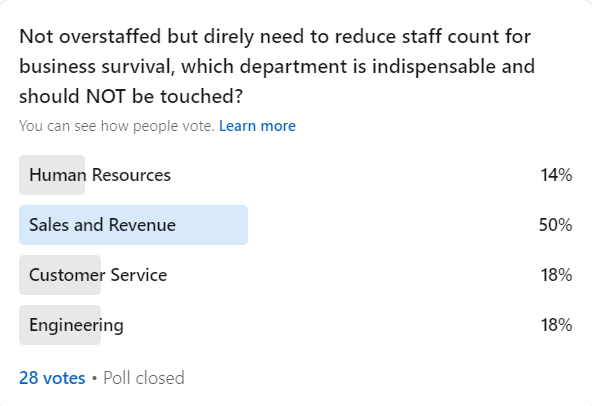There's no denying that the occurrences of the past 20 months shook the global tech space. Stories like Jeremy Joslin's (a staff software engineer at Google) and Caitlin Harrington's (a seasoned tech/labour journalist at WIRED) help put faces to otherwise cold facts about layoffs the industry is yet to recover from.
After dedicating 20+ years of his career to launching products and leading teams, Joslin was one of 12,000 Nooglers let go on one cold morning in January 2023, around the time tech giants like Microsoft and Amazon also laid off.
Ironically, on December 13, 2023, Harrington tweeted that she and 18 others had been let go after reporting on several employees' struggles with layoffs. This explains the indiscriminate nature of these job cuts which were influenced by brutal economic challenges resulting in a need to cut costs.
Companies lay off for different reasons, but deciding which departments are essential and dispensable must be one huge headache.
When Blockchain payment platform, Bitmama Inc. acquired Payday in December 2023 through its cross-border payments product, Changera, Techpoint Africa discovered Changera was set to absorb Payday's employees across departments, including marketing, customer service, and engineering, while others were to be laid off. What influenced this?
The first set of people to get sacked are usually those with non-revenue-generating roles.
The result of this LinkedIn poll reflects which department is considered more important.

We ask five professionals across four departments you'll find in a typical tech company — engineering, product, sales and marketing, and customer service — to make a case for their teams, highlighting their importance to every company and why they shouldn’t be considered essential staff during layoffs.
Sales and marketing
Chris Anaele - Tech Sales Expert and Business Development Manager at Seamfix.
The role of the marketing team in a B2B company is to create awareness, generate leads, and put the company and the product out there for the right customers to see, choose, and buy. The sales team is saddled with the task of talking to those customers and getting them to buy.

Suck at managing people?
Give it a try, you can unsubscribe anytime. Privacy Policy.
If it's a B2C setting, you probably won't need salespeople, depending on what the ticket size is. You just need marketing people who will put the word out.
Money is the lifeline of any business and in our current landscape, where investors don't invest as much as before, businesses have to make money.
It's no longer business as usual, where, as a CEO, you're thinking, "Oh, when are we going to raise our next round so that we can still have money in the bank to keep running?” It is now, “How are we going to make money to run the business and stay alive?"
The sales and marketing team is the team that creates awareness about the product or the company and then sells it to generate revenue for the company, right?
That's basically what they do — help the company make revenue. And if the company makes revenue, it stays alive. In the absence of this team, the company will not make as much money as it should.
If you have a B2B company that nobody's actively putting out there in terms of creating content, creating blogs, and social media posts, nobody actively taking their product to the front of key decision-makers in organisations that can buy from them, then nobody will actively buy the product.
What it means is they will just sit there hoping that one day somebody will find out about them and buy from them. And that's a recipe for a dead company.
The sales and marketing team have key components for revenue generation. They are the key to revenue making. Sales and marketing bring new customers in, but customer care is more about retention.
The guys that build the product are important because, without the product, you can't sell anything. But if you have a very good product and you can't sell it, then it becomes a problem.
Engineering
Michael Madumere, Head Technology Officer, Tegence AI, a technology service company that specialises in building advanced AI solutions to businesses and organisations across industries.
The engineering team is the backbone of a tech company, because essentially, a tech company is one that is building a digital product that has to be deployed most of the time. So you will need some form of technical knowledge to make that work.
What the team does is help a company build the products it is going to sell or have users subscribe to — it could be fintech, medtech, or any other digital product.
The team also maintains the product, ensuring it's scalable enough for their customers to use efficiently.
Of course, the absence of an engineering team means building is going to be impossible unless it's being outsourced. Outsourcing could solve the problem of building, but not for maintaining and ensuring that the product meets customers' standards, tracking customers' usage and needs, building out new features or new product lines, and ensuring the product is safe; you need an in-house team for all that.
Having an engineering team on board is important for security reasons because building a technical product means that you are open to vulnerabilities and people could have malicious intent towards your product, so you need to secure it. What other way to do that than to have a trustworthy in-house team?
There is a relationship between the product and engineering teams; most times, you'll see them work together. The product team understands and communicates customers' needs to the engineering team.
Revenue generation is as important for the technical team as it is for the sales and marketing team, because for the product to be sold in the first place, it has to exist. If you are going to make sure all the stakeholders are satisfied with your products and services, they must meet the standards set by customers.
Keeping customers happy means the product has to be good, functional, and efficient and that's why you need a technical team — to keep things afloat.
There's also the aspect of thought leadership from the engineering team. I'll explain. If you are building a technical product used by engineers or technical people, who's in the best position to give some vote of confidence to these people (through technical content/messages) than the people building the product/technology?
For example, a company building cloud services or a database will interface primarily with developers. The thought leadership required to do this seamlessly can only be built by a team of engineers who will communicate your message in the language understood by developers.
This is not exhaustive. There are so many other moving parts with the engineering team. But the primary reasons you need an engineering team on board are to keep your product running, ensure that your product is up to date with the latest technology for security reasons, for customer satisfaction, and for revenue generation reasons.
Product
Oluwatosin Amusan, Senior Product Manager of a Dublin-based telecommunication company.
The roles and responsibilities of the product team are quite interesting. We are to align the company goals and business objectives with the users' needs. We stand as the conduit between the company's objectives — what is the company trying to do? What is the company's strategy? What is the company's revenue goal? — and we also stand in the middle of the users and the company — what is the user problem that we're trying to solve? What does the user need?
Our job is to balance the users' needs with the company objectives. It goes from ideation and discovery phase to designing. After design, we need to translate to acceptance criteria and business objectives for the engineering team to execute.
In certain instances, the product manager/product owner will have to align with the engineering lead or tech lead and break this down into technical specifications.
The product manager takes care of the product lifecycle. This begins with idea conception to the execution of that product, to the maintenance when it goes live, to determining iterations, to measuring the work a feature is delivering when it comes to whatever metrics we have already set. We also decide when to sunset a product feature.
If we then see that the feature is high effort, low reward, we decide to kill it.
We're at the intersection of different parts of the business' funnel. Let's say a company decides it wants to hit 10 million new users and make $10m. Our job is to identify what features would help it hit that goal. We work on prioritisation too.
The product team also does a big job in alignment of all the stakeholders — marketers, legal, and engineers. We are in the middle and ensuring that all the stakeholders are aligned and consulted before anything goes out.
We also work on execution of the things we've agreed to do. This includes looking back, measuring those metrics with the data team, deciding if it was worth it, and the necessary iterations.
Keeping an eye on our competition is also crucial so that we are not left behind; we also need to look at society.
A company without a product team is like a house without a mother; it is going to lack alignments, direction, and have much friction.
There's going to be a risk of moving fast in the wrong direction. The company would have many frustrated, disgruntled, and burnt out employees. It is a recipe for disaster in my opinion.
Interestingly, laying off some engineers affects your velocity because you cannot churn out as much as you typically would. But if you let go of a product manager (and there's no one to step into that role), your engineers will lack alignment.
If you remove the product manager and now the CEO or the leadership team is talking directly to certain members of the team, they would not be able to translate the vision.
To answer the question of how important a product team is to revenue generation is answering how important your users are to you.
No matter how great marketing does, they can spend all the money in the world and get the customers to the door of the shop, but if the customers come into the shop and they don't have a lovely experience, you're going to keep spending money on awareness and activation and not on conversion and retention.
If you really need to keep your team lean, make sure you have a product manager and a product designer, then figure out who will do the job of a product owner. It can be done by the engineering manager, if there is one; it can also be done by the product manager.
Do not lay off your whole product team because you think they are too slow. You need to be able to take some time to validate.
The best thing for any product team is that there is full alignment between the leadership, the product team, and the engineering team, and everybody's happy.
Respect your product team today and equip them to do their best work.
OrevaOghene Ben-Orupete, Product Manager, CX-Couer, a customer success consultancy.
In the product team, there are a couple of roles, depending on what stage the company is.
There's the product manager with the all-encompassing role of leading the product from ideation to the development phase.
There's the product designer who does user research and brings the product to life. Design-wise, they visualise what the product manager is thinking with an understanding of users' pain points and how the product can help them.
Then you have the product owner. In some companies, there is a product manager and also a product owner for specific products. A product owner is just a product manager attached to one thing.
This person helps you understand how to optimise an app, for instance, for users, collecting feedback, deciding what features should be built next, and the next sprint.
Also, some teams, depending on the size, have a UX writer and a content designer. They work in tandem with the product manager and the product designer to determine how the user experience will be when they are reading what appears on the product — app or website.
The product team basically determines what the company builds, focuses on, and invests in. They lead the company in a direction called a north star. Without a product team or product lead, the company would be led astray without a clue what to focus on or prioritise. And this shows a lack of care for the users.
A lot of tech founders and CEOs get caught up in the need to build a new feature or this shiny thing, or an app, instead of focusing resources on building what people actually want.
The product team helps to recalibrate the direction of the entire team towards something that will generate revenue for the company.
Engineering teams usually just build what they are told. But who determines where the feature is placed, or how it shows up, or what the user sees, or how useful it is? The product team.
They take feedback from the customer and transfer it into insights for the engineering team to build, for the marketing team to sell, and for the customer success team to troubleshoot customer problems on.
Call them the "Fulcrum" because they are crucial to revenue generation. If you are not building the right thing, you won't make money. You will build products but will soon begin wondering why you are not getting customers or why the product is not working. You might make money from your product if it's very needed and you don't have any competitors, but when you start getting more people, you make more money when you can distill what they want from what you are giving them.
Finally, the product team does stakeholder management.
Who are your stakeholders? The management, the engineers, marketers, customer care, and customers. They ensure everyone is satisfied and happy. For a product person, everybody needs to be satisfied, to a large extent, for your work to get done, for you to be successful, and for the company to be successful.
Customer service
Priscilla Amadi, Founder, Service Culture Academy
Priscilla helps professionals become valuable and service-oriented employees with the mindset of revenue generation. Popularly called Service Culture Evangelist, she's been a customer relations professional for 12 years helping businesses generate revenue from their customers.
Every business exists to serve customers. And if you are to serve customers, shouldn't there be a department whose role is to ensure that the customer's needs are being met? This is where customer service comes in.
I describe Customer Service as a verb, an action word to keep on serving. With the action of service, it can achieve many functions — you can build your customer experience and ensure your customers find success.
Depending on the company's focus, you have roles like customer success, account managers (for B2B companies), client managers, and customer relationship managers. You also have business development because you need to interact with customers.
Depending on how creative your company wants to be, each designation has its focus points. Most times, the way the roles are interchangeably used worries me because when you understand these roles' core functions, it helps you clarify many things and clears the air as to how your actions are being carried out.
Customer experience is different from core customer service, which may just be interacting with the customers. It is also different from customer success or account management/client relations, which are all angles that customer service has branched into.
Many people do not know this, but do you know that sales is also a way to serve your customers?
Most companies seldom understand how important customer service is until they cross the red line in their income sheets, where customers no longer use their services.
Show me a business that is struggling with income and I will show you a business that never really cared about its customers. Because if you care about your customers and provide solutions that they need, you will never want for income.
While it is essential to design a customer service strategy from the beginning, it is equally important to put value to these things because most times people just set up the department just to speak to customers. There's more to a customer service department.
When your customers are happy with the product and service, what most likely happens is that they become returning customers. The probability of that customer telling other people about your product — which is word-of-mouth marketing that nobody hardly pays for — is very high.
With good customer service, your marketing can work, your sales can be much more productive, and all these other revenue-generating actions can have more sticky power — customer retention.
It is very important that customer service is taken seriously, especially in startups.
Startups invest in marketing and sales, but do not invest in customer service most of the time. And that for me is a huge concern because if you're doing customer service right, it really sells your product.
We've seen situations where startups just disappear after a few years. We've had situations where huge corporations went off the radar because they didn't see it coming, they didn't serve their customers, or they were busy serving themselves while thinking they were serving customers.
Want to make a case for your team? Shoot us an email at news@techpoint.africa






















